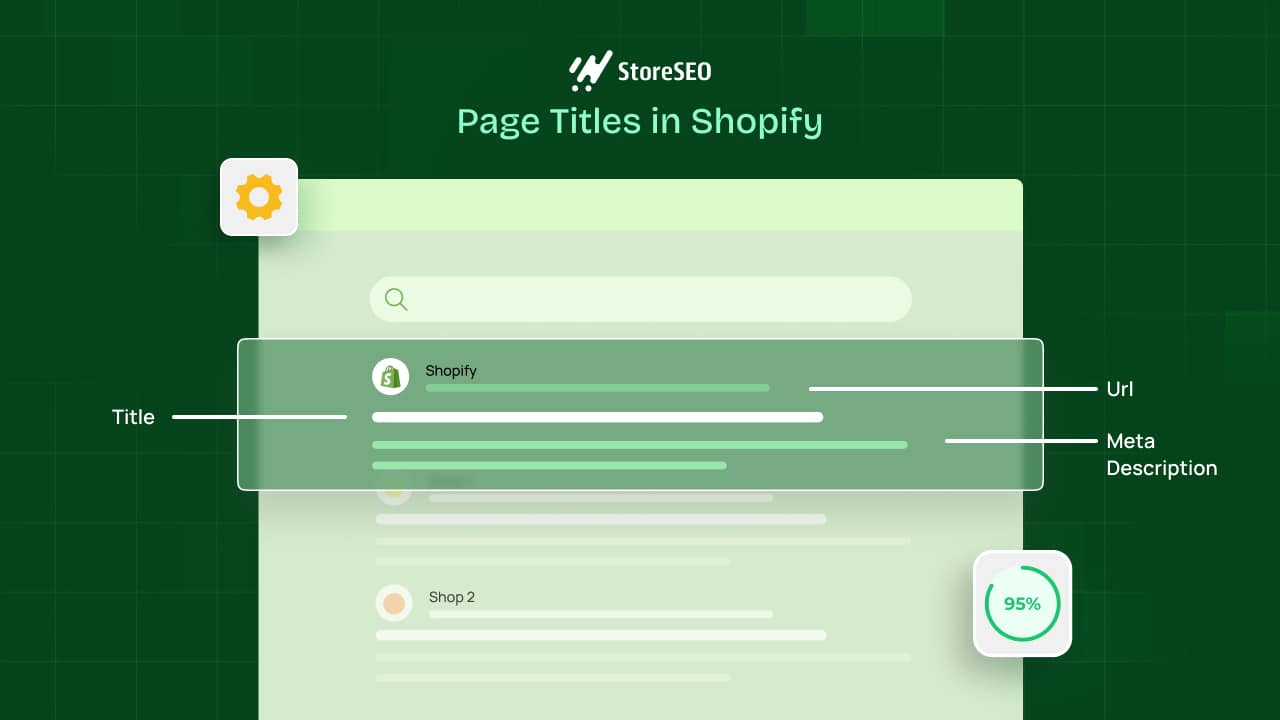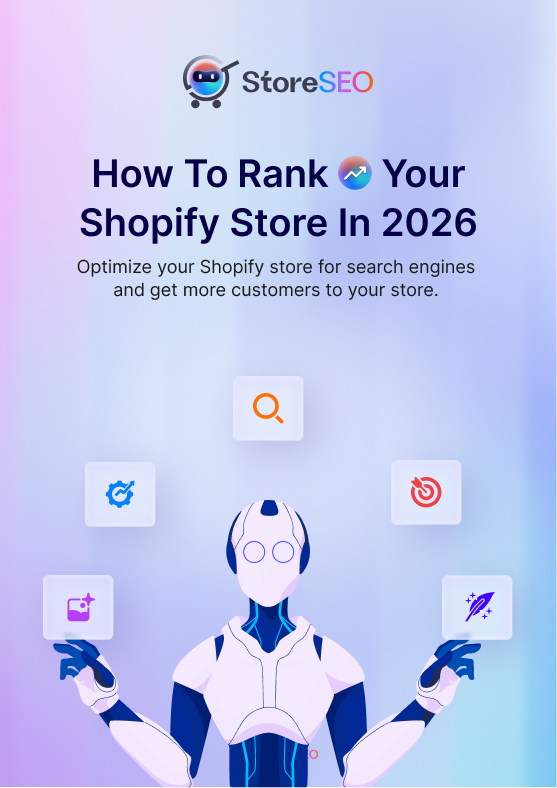Vous êtes-vous déjà demandé pourquoi certaines boutiques en ligne attirent des tonnes de visiteurs alors que d'autres ont du mal à le faire ? La raison pourrait être les titres de page, car ils sont comme les titres de votre boutique en ligne. C'est la première chose que les gens voient lorsqu'ils recherchent des produits comme le vôtre. Faites-les bien et vous aurez plus de clics, plus de visiteurs et plus de ventes. Dans cet article de blog, nous allons vous expliquer tout ce que vous devez savoir sur titres de page dans Shopify. Et partagez d’autres conseils d’optimisation pour votre boutique en ligne Shopify.
![Page Titles in Shopify: All You Need to Know [with SEO Optimization Tips]](https://storeseo.com/wp-content/uploads/2024/07/StoreSEO-Page-Titles-in-Shopify_-All-You-Need-to-Know-with-SEO-Optimization-Tips-2-1024x576.jpg)
Que sont les titres de page et pourquoi sont-ils importants ?
Les titres de page sont le texte qui apparaît dans la barre de titre ou l'onglet d'un navigateur Web lorsque vous visitez une page Web. Ce sont également les titres cliquables affichés sur les pages de résultats des moteurs de recherche (SERP). Les titres de page sont un élément fondamental du référencement sur page et jouent un rôle crucial dans l'expérience utilisateur et l'optimisation des moteurs de recherche.
Le rôle des titres de page
- Premières impressions:Les titres de page sont souvent la première chose que les utilisateurs voient lorsqu'ils rencontrent votre site dans les résultats de recherche. Un titre bien conçu peut inciter les utilisateurs à cliquer sur votre lien plutôt que sur celui d'un concurrent.
- Avantages du référencement:Les moteurs de recherche comme Google utilisent les titres de page pour comprendre le contenu d'une page. Un titre clair et pertinent aide les moteurs de recherche à indexer correctement votre page, ce qui peut améliorer votre classement dans les résultats de recherche.
- Expérience utilisateur : Un titre de page descriptif aide les utilisateurs à comprendre ce qu'ils peuvent attendre de la page. Cela peut réduire les taux de rebond et améliorer l'engagement des utilisateurs, car les visiteurs sont plus susceptibles de rester sur une page qui répond à leurs attentes.
- Marquage : Inclure le nom de votre marque dans le titre de la page peut contribuer à la reconnaissance de votre marque et à la confiance qu'elle suscite. Les utilisateurs sont plus susceptibles de cliquer sur un lien provenant d'une marque qu'ils connaissent.
Titres de page dans Shopify
En ce qui concerne les titres de page dans Shopify, ils sont importants pour le succès du commerce électronique. Les titres Shopify sont les titres que vous définissez pour vos pages de produits, vos collections et d'autres pages de votre boutique Shopify. Voici pourquoi ils sont importants :
- Visibilité du produit:Des titres efficaces peuvent rendre vos produits plus visibles dans les résultats des moteurs de recherche, générant ainsi plus de trafic vers votre boutique.
- Taux de clics:Un titre convaincant peut augmenter la probabilité que les utilisateurs cliquent sur le lien de votre produit lorsqu'il apparaît dans les résultats de recherche.
- Taux de conversion:Une fois que les utilisateurs sont sur votre site, un titre clair et descriptif peut les aider à comprendre rapidement le produit, ce qui entraîne des taux de conversion plus élevés.
Les titres de page ont un impact sur le référencement
Les titres de page ont un impact considérable sur le référencement en influençant le classement des moteurs de recherche, le taux de clics (CTR) et l'expérience utilisateur. Ils aident les moteurs de recherche à comprendre le contenu d'une page et à déterminer sa pertinence par rapport à des requêtes de recherche spécifiques, ce qui rend l'inclusion de mots clés pertinents dans les titres cruciale pour améliorer le classement.
![Titres de page dans Shopify : tout ce que vous devez savoir [avec des conseils d'optimisation SEO] 2 Page Titles in Shopify](https://storeseo.com/wp-content/uploads/2024/07/image-9.png)
Un titre de page convaincant et pertinent peut améliorer le CTR en inciter les utilisateurs à cliquer dessus dans les résultats de recherche, améliorant encore davantage les classements, car les moteurs de recherche peuvent considérer un engagement plus élevé comme un signe de contenu précieux.
De plus, des titres de page clairs et descriptifs contribuent à une expérience utilisateur positive en fournissant un aperçu rapide du contenu de la page, en aidant les utilisateurs à décider s'ils doivent cliquer sur le lien et en réduisant les taux de rebond en garantissant que les visiteurs trouvent ce qu'ils recherchent.
Bonnes pratiques pour créer des titres de page efficaces dans Shopify
Créer des titres de page efficaces est un aspect crucial du développement Web et du marketing numérique. Les titres de page, également appelés balises de titre, sont la première impression que les utilisateurs et les moteurs de recherche ont de votre page Web. Ils jouent un rôle important dans l'optimisation des moteurs de recherche (SEO) et l'expérience utilisateur. Voici quelques bonnes pratiques pour vous aider à créer des titres de page convaincants :
Comprendre l’importance des mots-clés
![Titres de page dans Shopify : tout ce que vous devez savoir [avec des conseils d'optimisation SEO] 3 Page Titles in Shopify](https://storeseo.com/wp-content/uploads/2024/07/image-10.png)
L'intégration de mots clés pertinents dans les titres de vos pages est essentielle pour le référencement. Les mots clés aident les moteurs de recherche à comprendre le contenu de votre page et à le faire correspondre aux requêtes de recherche des utilisateurs. Cependant, il est important d'éviter le bourrage de mots clés, qui peut donner à votre titre un aspect artificiel et spammeur. Visez plutôt une intégration naturelle de mots clés qui reflètent avec précision le contenu des titres de vos pages dans Shopify.
Restez concis et descriptif
Une stratégie efficace pour les titres de page dans Shopify est de les rendre concis mais descriptifs. Les moteurs de recherche affichent généralement les 50 à 60 premiers caractères d'une balise de titre, il est donc important de transmettre le message principal dans cette limite. Un titre concis aide les utilisateurs à comprendre rapidement le sujet de votre page, ce qui peut améliorer les taux de clics.
Utilisez des titres uniques pour chaque page
Chaque page de votre site Web doit avoir un titre unique. Les titres de page uniques dans Shopify aident les moteurs de recherche à différencier les différentes pages de votre site et à garantir que chaque page est correctement indexée. Ils permettent également aux utilisateurs de comprendre clairement le contenu distinct disponible sur chaque page.
Inclure le nom de votre marque
L'inclusion du nom de votre marque dans les titres de page de Shopify peut contribuer à la reconnaissance de votre marque et à la confiance qu'elle inspire. Cela est particulièrement important pour les marques connues, car cela peut augmenter la probabilité que les utilisateurs cliquent sur votre lien. En règle générale, le nom de la marque est placé à la fin du titre, séparé par un délimiteur tel qu'un trait d'union ou une barre verticale.
Privilégiez la lisibilité et la pertinence
Bien qu'il soit important d'optimiser votre site pour les moteurs de recherche, vous ne devez pas négliger l'élément humain. Les titres de vos pages doivent être faciles à lire et pertinents par rapport au contenu de la page. Évitez d'utiliser du jargon ou un langage trop complexe et assurez-vous que le titre représente fidèlement le contenu de la page. Cela permet d'instaurer la confiance avec votre public et de l'encourager à interagir avec votre site.
Incorporer des mots d'action
L'utilisation de mots d'action dans les titres de vos pages dans Shopify peut les rendre plus convaincantes et encourager les clics. Des mots comme «découvrir,”, “apprendre,”, “explorer," ou "trouver« peut créer un sentiment d’urgence ou d’excitation, incitant les utilisateurs à cliquer sur votre lien pour en savoir plus.
Évitez les titres en double
Les titres en double peuvent dérouter les moteurs de recherche et les utilisateurs. Pour les titres de page dans Shopify, ils peuvent entraîner une mauvaise indexation et un classement inférieur dans les résultats de recherche. Assurez-vous toujours que chaque page de votre site Web possède un titre unique et spécifique qui reflète avec précision son contenu.
Guide étape par étape pour optimiser les titres de page dans Shopify
L'optimisation des titres de page dans Shopify est très simple. Vous pouvez les optimiser à partir de votre tableau de bord. Cependant, si vous utilisez des applications tierces comme Référencement de magasin, vous pourrez optimiser les titres de vos pages dans Shopify plus facilement et plus efficacement. StoreSEO vous fournira plus de conseils et d'informations sur l'optimisation du référencement pour votre boutique Shopify qui aideront votre boutique à mieux performer sur la page de résultats de recherche Google.
Pour commencer à optimiser les titres de vos pages, installez d'abord StoreSEO sur votre boutique, puis suivez le tutoriel ci-dessous.
Étape 1 : Accédez à StoreSEO
Pour commencer à optimiser votre titre Shopify, accédez à « StoreSEO » et cliquez sur le bouton « Optimiser le référencement ».
![Guide sur le titre de la page d'accueil et les méta-descriptions de Shopify [avec exemples] 8 Page Titles in Shopify](https://storeseo.com/wp-content/uploads/2024/07/image-9.gif)
Étape 2 : Parcourez la section Titre
Une fois que vous êtes connecté, vous verrez la section méta-titre de votre titre de page. De plus, si vous faites défiler vers le bas. Ici, vous verrez une section où la méta-description et l'aperçu du site Web sont affichés.
![Guide sur le titre de la page d'accueil et les méta-descriptions de Shopify [avec exemples] 9 Page Titles in Shopify](https://storeseo.com/wp-content/uploads/2024/07/image-10.gif)
Étape 3 : Modifier le titre
Maintenant, dans cette section, allez dans la section méta-titre et modifiez-la en conséquence. Une fois que vous avez terminé, cliquez sur le bouton 'Sauvegarder' bouton.
![Guide sur le titre de la page d'accueil et les méta-descriptions de Shopify [avec exemples] 10 Page Titles in Shopify](https://storeseo.com/wp-content/uploads/2024/07/image-11.gif)
Étape 4 : Vérifiez l'aperçu
Après avoir enregistré les méta-informations, revenez aux sections d'aperçu pour voir les données mises à jour. Assurez-vous qu'elles sont clairement visibles et entièrement affichées.
![Guide sur le titre de la page d'accueil et les méta-descriptions de Shopify [avec exemples] 11 Page Titles in Shopify](https://storeseo.com/wp-content/uploads/2024/07/image-11.png)
Mettre en œuvre l'optimisation avancée du titre de la page
La maîtrise des titres de page avancés dans l'optimisation Shopify est essentielle pour améliorer les performances SEO de votre site Web et capter l'intérêt des utilisateurs. En incorporant des mots clés pertinents au début de vos titres, vous pouvez améliorer à la fois le classement des moteurs de recherche et les taux de clics des utilisateurs.
N'oubliez pas d'écrire pour votre public, en veillant à ce que vos titres soient convaincants et informatifs, ce qui attirera les clics et réduira les taux de rebond. Évitez le bourrage de mots-clés et assurez-vous que chaque titre est unique et spécifique au contenu de la page pour éviter la cannibalisation du trafic.
Alors, avez-vous trouvé notre blog utile ? Si oui, n'hésitez pas abonnez-vous à notre blog pour plus de conseils, de tutoriels et de mises à jour sur des sujets liés à l'industrie.











